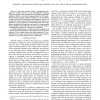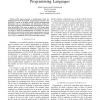104
click to vote
LADS
2007
Springer
15 years 8 months ago
2007
Springer
Programming languages based on the BDI style of agent model are now common. Within these there appears to be some, limited, agreement on the core functionality of agents. However, ...
104
click to vote
ATAL
2007
Springer
15 years 8 months ago
2007
Springer
This paper proposes programming constructs to improve the practical application of existing BDI-based agent-oriented programming languages that have formal semantics. The proposed...
102
click to vote
IROS
2007
IEEE
15 years 8 months ago
2007
IEEE
Abstract— This paper presents Meld, a programming language for modular robots, i.e., for independently executing robots where inter-robot communication is limited to immediate ne...
107
click to vote
COMPSAC
2007
IEEE
15 years 8 months ago
2007
IEEE
In recent years, TinyOS and nesC are gradually becoming the de facto software development platform for implementing sensor applications. However, developing sensor applications is...
103
click to vote
ACSC
2007
IEEE
15 years 8 months ago
2007
IEEE
Measuring "reuse" and "reusability" is difficult because there are so many different facets to these concepts. Before we can effectively measure reuse and reus...
104
click to vote
C5
2008
IEEE
15 years 8 months ago
2008
IEEE
End-user scripting languages are relatively easy to learn, but have limited expressive power. Tile-based scripting systems are particularly accessible to beginners, but usually ar...
105
click to vote
OOPSLA
2009
Springer
15 years 8 months ago
2009
Springer
Programming languages are the primary mechanism by which software is created, yet most of us have access to only a few, fixed, programming languages. Any problem we wish to expre...
195
click to vote
TPHOL
2009
IEEE
15 years 8 months ago
2009
IEEE
Abstract. We give an overview of Agda, the latest in a series of dependently typed programming languages developed in Gothenburg. Agda is based on Martin-L¨of’s intuitionistic t...
112
click to vote
LICS
2009
IEEE
15 years 8 months ago
2009
IEEE
In this paper we introduce “clipping,” a new method of syntactic approximation which is motivated by and works in conjunction with a sound and decidable denotational model for...
112
click to vote
IAT
2009
IEEE
15 years 8 months ago
2009
IEEE
—This paper proposes a module-based vision for designing BDI-based multi-agent programming languages. The introduced concept of modules enables common programming techniques such...


